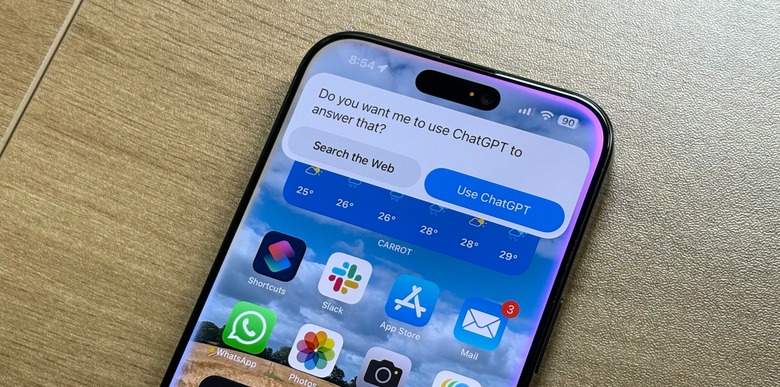Apple Intelligence Offers Improved ChatGPT Privacy, But There's A Catch
Apple released iOS 18.1 earlier this week, which brings the first Apple Intelligence features to iPhone 16 and the iPhone 15 Pro. ChatGPT integration isn't one of them, but that functionality will arrive as soon as iOS 18.2 is released in the coming months. Meanwhile, Apple also released the first iOS 18.2 beta, so you can test ChatGPT integration as soon as you install the build.
This should not be confused with the standalone ChatGPT app for iPhone, which has been available for quite a while. In fact, the app is available even on devices that do not run iOS 18. The ChatGPT integration in iOS 18 allows you to invoke OpenAI's chatbot by talking to Siri. You can even bypass Siri if you want to.
What's interesting in all of this is that OpenAI has to adhere to Apple's strong privacy features for Apple Intelligence. That means you'll get better ChatGPT privacy than using the app directly. But there is one expected twist: Apple's stronger privacy requirements apply as long as you use ChatGPT integration without signing into an OpenAI account. That's something Apple explained earlier this year.
We now have the specific privacy rules governing ChatGPT use in Apple Intelligence.
Apple published the full release notes for ChatGPT integration and user privacy, which 9to5Mac dug up.
How to enable ChatGPT in Apple Intelligence
ChatGPT will work with Siri, Writing Tools, and Visual Intelligence. The latter is an iPhone 16 exclusive feature. You have to use Camera Control to invoke this Google Lens-like app.
However, the ChatGPT integration is turned off by default. You must manually enable it in the ChatGPT menu, which is found in the Settings app under the Apple Intelligence & Siri menu.
Once enabled, you can use ChatGPT in two ways. You can ask Siri a question and let Apple's assistant determine whether ChatGPT would have a better answer. Or you can instruct Siri to tell ChatGPT your prompt directly.
Unless you disable it from the Settings app, Siri will ask you every time to confirm you want to send a request to OpenAI's chatbot, assuming you use the scenario where you let Siri determine what it should do with your prompt.
There's one more thing: You will have to decide whether to use ChatGPT integration with your OpenAI account. Your privacy protection will differ depending on what you choose.
Using ChatGPT integration without an OpenAI account
If you choose not to sign into your ChatGPT account, you'll get the best privacy protections possible in Apple Intelligence. Here's Apple's complete explanation:
If you access the ChatGPT integration without an account, only the request and attachments like documents, photos, or contents of the document will be sent to ChatGPT to answer your request. OpenAI also will not receive any information tied to your Apple Account. Your IP address is obscured from ChatGPT, but the general location is provided for purposes such as enabling ChatGPT to prevent fraud and comply with applicable law.
OpenAI is required to process your request solely for the purpose of fulfilling it and not store your request or any responses it provides. OpenAI also is required not to use your request to improve or train its models.
One could argue that you get the same protections if you set your ChatGPT privacy correctly from your ChatGPT account. That's what I did long ago. I opted not to have my data train the chatbot. I did it back when the chat history feature was tied to allowing OpenAI to use your data. There was a way to opt out.
Now, you can opt out without losing your chat history.
The problem with using ChatGPT without an account is that you won't get access to the premium features associated with your OpenAI account. You might have a ChatGPT Plus subscription which gives you access to the latest OpenAI features and has fewer limitations in place.
Using ChatGPT integration with an OpenAI account
If you sign into your ChatGPT account, Apple Intelligence privacy protections won't apply similarly:
When you are signed in, your ChatGPT account settings and OpenAI's data privacy policies will apply. This means OpenAI may log your request, attachments, and session history and use this data to train or improve their models. To learn more about OpenAI's privacy practices, visit https://openai.com/policies/row-privacy-policy and https://openai.com/policies/row-terms-of-use.
In this case, you'll have to ensure that your privacy settings are set correctly in ChatGPT.
What data Apple collects
Apple collects limited data about your interactions with ChatGPT in Apple Intelligence, according to the same document:
Apple collects limited information about your requests to ChatGPT and ChatGPT's response, such as the number of requests sent, or the approximate size of the request or response in order to operate the service and prevent fraud.
When used with Siri, Apple will also collect information about your ChatGPT request.
If you choose to opt in to improve Siri and Dictation, Apple may also log your request and response anonymously. That is, audio recordings and transcripts of your request and the response offered may be saved, but they will not be tied to your Apple Account.
